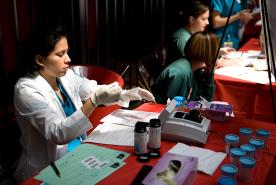Last Updated: December 13, 2024
Medically reviewed by NKF Patient Education Team
About Goodpasture Syndrome
Goodpasture syndrome is an uncommon autoimmune disease that affects both the kidneys and the lungs. An autoimmune disease means that the immune system, which usually protects the body from infection, instead attacks healthy parts of the body.
Goodpasture syndrome is named after Ernest Goodpasture, the American pathologist who first described the disease in 1919 while studying the influenza pandemic.
Signs and Symptoms
Symptoms of Goodpasture syndrome can relate to kidney disease or lung disease.
Signs and symptoms related to kidney disease may include:
- Appear pale and feel tired (anemia)
- Nausea and vomiting
- Protein in the urine (albuminuria/proteinuria)
- Blood in the urine (hematuria)
- Back pain below your ribs
- Frequent nighttime urination
- Swelling of the hands and feet (edema)
- High blood pressure
Symptoms related to lung problems can include dry cough, shortness of breath, or coughing up blood.
Goodpasture Syndrome
Sign up for a deep dive into Goodpasture Syndrome
Learn about Goodpasture Syndrome, receive additional resources, and learn so much more.
Causes
The body's immune system produces antibodies, which are proteins that help fight infections. However, in Goodpasture syndrome the body makes antibodies that attack and damage the lining of the lungs and kidneys. As a result, if you have this disease, you may start to experience fatigue, weakness and loss of appetite. However, the disease may quickly progress and cause bleeding in the lungs. It can also cause inflamed kidneys (glomerulonephritis). It is not exactly known why your antibodies begin to attack your own lungs and kidneys, but different factors may play a role.
A combination of environmental and genetic factors may increase disease risk.
Research is being done to discover genetic factors that are important in the disease. Researchers found a link between Goodpasture syndrome and some types human leukocyte antigen (HLA), a group of proteins with a role in the immune response.
Environmental factors that may trigger the disease include exposure to lung infection, smoking, or breathing in vapors from organic solvents (gasoline, paint thinner, other petroleum-based products).
Complications
Goodpasture syndrome can cause life-threatening bleeding in the lungs and respiratory failure. It can also cause glomerulonephritis. The damage done to the kidneys can lead to kidney failure.
Diagnosis
Blood and urine tests can check for signs of Goodpasture syndrome and kidney disease. Your lungs will also be checked for signs of lung disease.
Tests
There is a specific blood test that can show if you have harmful antibodies that can attack your lungs and kidneys. These antibodies are known as anti-glomerular basement membrane (anti-GBM) antibodies.
Urine and blood tests can check for signs of kidney disease. Estimated glomerular filtration rate (eGFR) is a blood test that checks how well the kidneys are filtering your blood. A urine albumin-to-creatinine ratio (uACR) is a urine test that checks for high protein (albumin) in your urine, which is a sign of kidney damage. A urine protein-to-creatinine ratio (uPCR) may be used for certain kidney diseases. This test is similar to the uACR test, which measures albumin. Instead of measuring only the amount of albumin in your urine, it measures all the different proteins that may be present.
kidney biopsy may also be needed to help confirm a diagnosis. A kidney biopsy is a test in which one or more tiny pieces (samples) of your kidney is removed and then looked at with special microscopes. The microscopes make it possible to see the samples in greater detail.
Your lungs may also be checked for damage with a chest X-ray, CT scan, or lung biopsy.
Treatment
Overview
Early diagnosis and treatment are the best ways to prevent or slow kidney damage. Your healthcare professional may give you medications to help slow the immune system and try to keep it from making harmful antibodies. You may also be given medication to control fluid buildup or high blood pressure.
A healthcare professional may suggest that you undergo plasma exchange (plasmapheresis), a special blood filtering process, to remove harmful antibodies. Plasma exchange involves using a machine to separate plasma (along with the harmful antibodies) from blood and then returning the blood back to the person. A person may receive several treatments over a few weeks.
Goodpasture syndrome can lead to kidney failure, which is treated with dialysis or a kidney transplant.
Medications
Cyclophosphamide is a medication used to treat certain types of cancer and nephrotic syndrome. Cyclophosphamide is part of a group of medications called alkylating agents, which can be used in chemotherapy to slow the growth of cancer cells. It can also be used to suppress or slow the immune system for people with Goodpasture syndrome.
Corticosteroids, also known as steroids, are a type of medication (immunosuppressants) that can help the kidneys recover by calming the immune system and reducing the production of harmful antibodies. This can keep the immune system from hurting the kidneys. Other immunosuppressants may also be used.
If you have kidney disease as a result of Goodpasture syndrome, you may need a type of blood pressure drug called an ACE inhibitor or an ARB. These two drugs control high blood pressure and reduce the amount of protein in the urine. Diuretics (water pills) are used to remove extra fluid from the body (edema). Other medicines for kidney disease can include an SGLT2 inhibitor and/or an nsMRA
Nutrition
Sometimes you may be asked to make changes to your diet due to high blood pressure or kidney disease. For example, you may need to reduce sodium (salt) in your diet. A dietitian can help you with these changes.
Not smoking and avoidance of secondary smoke is very important. People with Goodpasture syndrome should also avoid vapors from organic solvents.
Questions to Ask
- Am I at risk for Goodpasture syndrome?
- Are there any changes I need to make with my diet? If so, can you please refer me to a dietitian to help me with my diet?
- Do you recommend any changes with my medications?
- What else can I do to prevent Goodpasture syndrome or keep it from getting worse?











